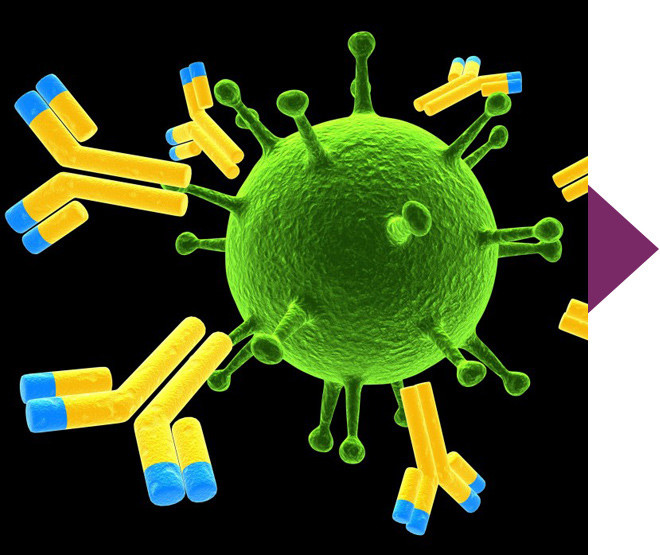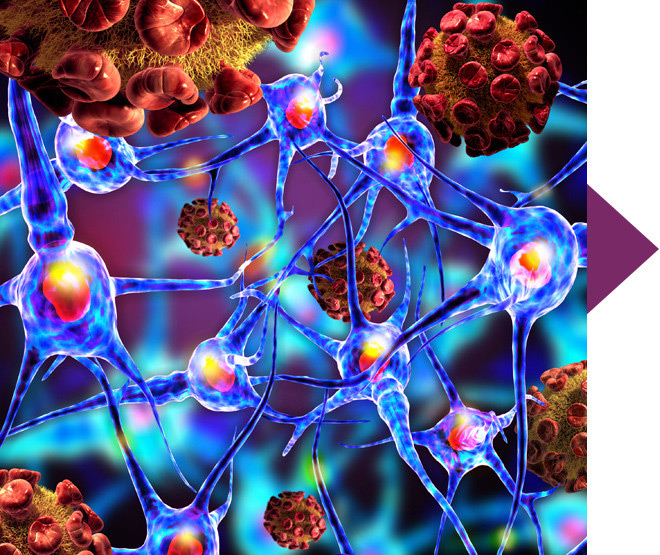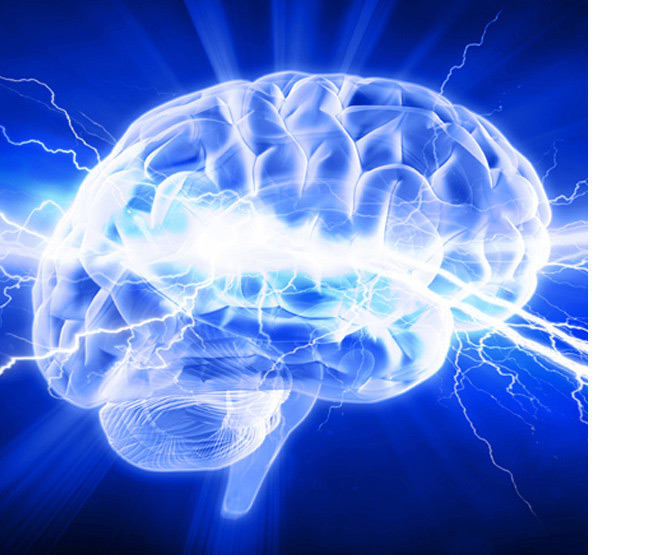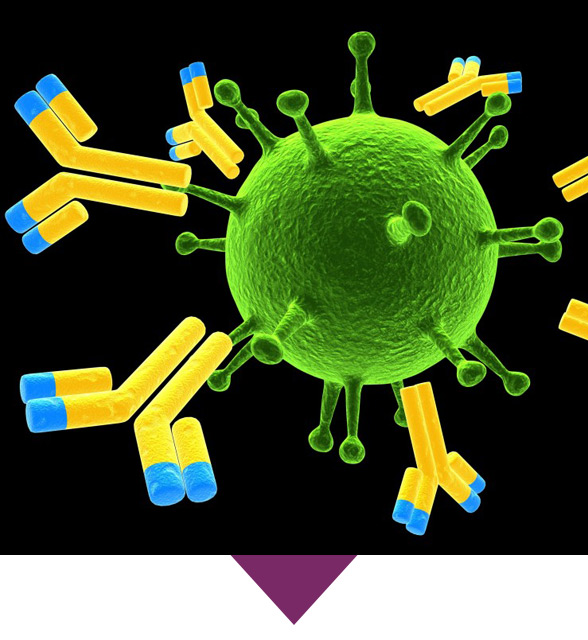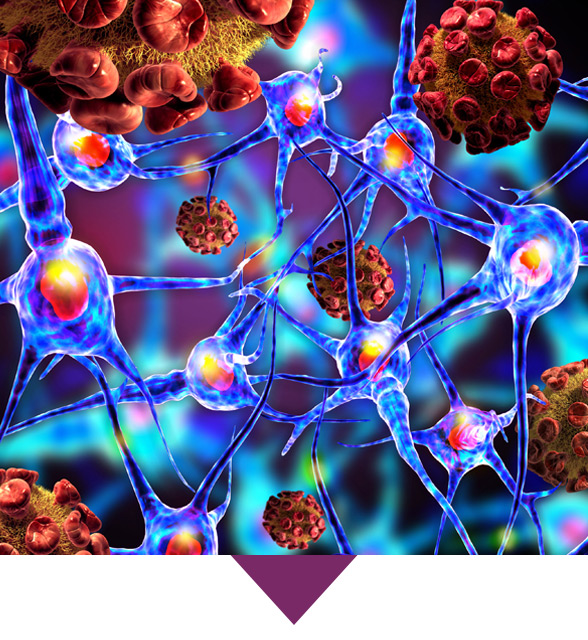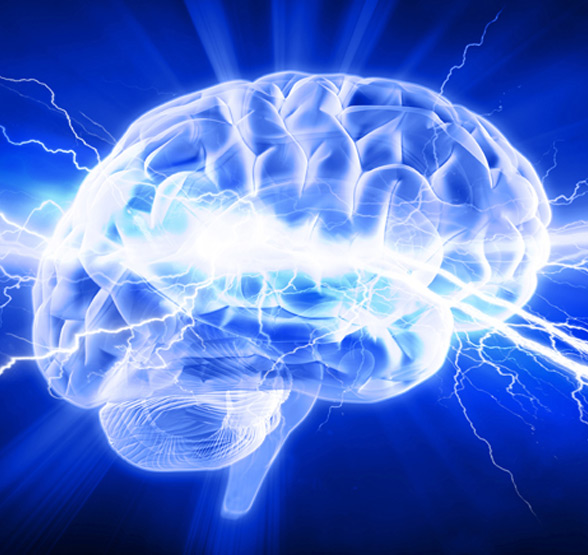Antibodies attacking brain tissue can trigger neuropsychiatric symptoms
In some individuals, common infections can trigger an abnormal autoimmune response, whereby antibodies produced to destroy a harmful pathogen (i.e., bacteria, virus), mistakenly attack healthy cells in the brain. This can cause inflammation in the brain and result in an onset of various neuropsychiatric symptoms.
Infections, antibodies and brain inflammation
An increasing prevalence of both bacterial and viral infections have been described for patients with psychiatric disorders. 2 In fact, “a wide variety of infections, even common ones like bronchitis, are linked to a higher risk of many mental illnesses in children and adolescents.” 3
In a subset of pediatric patients, strep infections can trigger an autoimmune response which leads to antibodies attacking brain cells in a specific region of the brain, causing an abrupt onset of OCD-like behaviors and/or tics and other neuropsychiatric symptoms.
And one study found the risk of developing a mental illness was increased further depending upon the number and severity of infections the individual had. 3 “So there is this load of infection that seems to impact the brain and mental disorders.” 4
The brain used to be considered “immune privileged,” protected by a “blood-brain barrier.” That is, antibodies produced by the immune system could not enter the brain. But we now know that infections and inflammation can open up the blood-brain barrier, permitting autoantibodies to enter the brain and trigger central nervous system disorders. 5
“The circulating brain-reactive antibodies and cytokines are particularly likely to reach the brain after compromise of the blood-CNS barriers during periods of stress, infections, and inflammation.” 5
Other researchers agree that antibodies attacking brain tissue can occur in response to an infection. “Infections and their autoimmune sequelae have been linked to brain pathologies that manifest as adventitious movements and abnormalities of behavior, emotion, and cognition.” 6
READ MORE: How antibodies cross the blood-brain barrier
Molecular mimicry and neuropsychiatric symptoms
Through a process known as molecular mimicry, infectious pathogens can trigger an autoimmune response resulting in the onset of neurologic and/or psychiatric symptoms.
Molecular mimicry occurs when the body’s immune system mistakenly attacks healthy tissues because of similarities between a particular molecule on an infectious agent (i.e., bacteria, virus) and the molecules in our own body tissues. 7 Molecular mimicry is believed to play a large role in autoimmune diseases. 8
“Molecular Mimicry” and Infection-Triggered Autoimmune Neuropsychiatric Symptoms
Microbial,
Viral,
Fungal
Infection Occurs
Humans Produce Antibodies that Recognize Infectious Agents
Antibodies May Cross-React with Neurologic Receptors (molecular mimicry)
Dysfunctional Immune Response Disrupts Brain Function
Microbial, Viral, Fungal Infection Occurs
Humans Produce Antibodies that Recognize Infectious Agents
Antibodies May Cross-React with Neurologic Receptors (molecular mimicry)
Dysfunctional Immune Response Disrupts Brain Function
Rheumatic Fever is one example of how molecular mimicry can result in an autoimmune disease. If a strep infection is left untreated, the immune system will normally produce antibodies to destroy strep bacteria. But in some individuals, this process goes awry and antibodies meant to attack harmful bacteria also attack healthy heart tissue.
Rheumatoid arthritis occurs when autoantibodies attack the joints. Type 1 Diabetes occurs when autoantibodies attack the pancreas.
Researchers now recognize that various forms of autoimmune encephalitis can occur when antibodies attack the brain. 9
“Those autoantibodies target essential neurotransmitter receptors, ion channels, or associated proteins on the membrane of neuronal cells…” 9 And, “once the autoantibodies reach the CNS [central nervous system] they can cause disease as it has been observed in autoimmune encephalitis.” 9
Antibodies attack brain tissue can lead to basal ganglia encephalitis
The type of autoimmune encephalitis depends upon the antigen targeted. “An expanding array of pathogenic neuronal autoantibodies are being identified, each targeting different neuronal surface antigens and thought to cause distinct and clinically recognizable encephalitic syndromes.” 10
For example, anti-NMDA receptor encephalitis occurs when the immune system creates antibodies that target NMDA receptors in the brain. 10 This condition is described in the bestselling book “Brain on Fire.”
In basal ganglia encephalitis, antibodies target components located in the basal ganglia region of the brain. These targets may include the Dopamine D1 receptor, Dopamine D2 receptor, Lysoganglioside GM1 and Tubulin. When antibodies bind to or block these targets they disrupt functioning, resulting in neurologic and psychiatric symptoms. 6
The autoantibodies may also trigger inflammation (encephalitis) in the basal ganglia. This can contribute to the onset of symptoms, such as obsessions, compulsions, tics, ADHD-like behavior, mood swings, seizures, anxiety and depression.
A study demonstrated that the Cunningham Panel™ of tests 6 can serve as an aid to clinicians in diagnosing infection-triggered basal ganglia encephalitis, characterized by neuropsychiatric symptoms.
The Cunningham Panel measures the levels of antibodies directed against the antigen targets Dopamine D1, Dopamine D2, Lysoganglioside and Tubulin. The 5th test, the CaM Kinase II, is an activation assay. Each target is associated with specific neuropsychiatric behaviors.
“Movement, behavioral, and neuropsychiatric disorders in children have been linked to infections and a group of anti-neuronal autoantibodies [measured with the Cunningham Panel™], implying dopamine receptor-mediated encephalitis within the basal ganglia.” 6
It is important to consult with your doctor for suspected basal ganglia encephalitis, which includes PANS and PANDAS, since treatment focuses on eradicating the infection(s), inflammation, and addressing the abnormal immune response. When the underlying root cause is identified and treated, these symptoms typically resolve or are greatly reduced. 11
- Causes of Mental Illness. WebMD.com
https://www.webmd.com/mental-health/mental-health-causes-mental-illness#1 - Belz M, Rehling N, Schmidt U, Wiltfang J, Kis B, Wolff-Menzler C. Bacterial infections among patients with psychiatric disorders: Relation with hospital stay, age, and psychiatric diagnoses. PLoS One. 2018;13(12):e0208458. Published 2018 Dec 4. doi:10.1371/journal.pone.0208458
https://www.ncbi.nlm.nih.gov/pmc/articles/PMC6279031/ - Köhler-Forsberg O, Petersen L, Gasse C, et al. A Nationwide Study in Denmark of the Association Between Treated Infections and the Subsequent Risk of Treated Mental Disorders in Children and Adolescents. JAMA Psychiatry. 2019;76(3):271–279. doi:10.1001/jamapsychiatry.2018.3428
https://jamanetwork.com/journals/jamapsychiatry/fullarticle/2716981 - Chatterjee R. Infections May Raise The Risk Of Mental Illness In Children. NPR. 2018 Dec. 12.
https://www.npr.org/sections/health-shots/2018/12/05/673700889/infections-may-raise-the-risk-of-mental-illness-in-children - Benros ME, Waltoft BL, Nordentoft M, et al. Autoimmune Diseases and Severe Infections as Risk Factors for Mood Disorders: A Nationwide Study. JAMA Psychiatry. 2013;70(8):812–820. doi:10.1001/jamapsychiatry.2013.1111
https://jamanetwork.com/journals/jamapsychiatry/fullarticle/1696348 - Chain JL, Alvarez K, Mascaro-Blanco A, et al. Autoantibody Biomarkers for Basal Ganglia Encephalitis in Sydenham Chorea and Pediatric Autoimmune Neuropsychiatric Disorder Associated With Streptococcal Infections. Front Psychiatry. 2020;11:564. Published 2020 Jun 24. doi:10.3389/fpsyt.2020.00564
https://www.ncbi.nlm.nih.gov/pmc/articles/PMC7328706/ - Cunningham M. 2019. Molecular Mimicry, Autoimmunity, and Infection: The Cross-Reactive Antigens of Group A Streptococci and their Sequelae. Microbiol Spectrum 7(4):GPP3-0045-2018. doi:10.1128/microbiolspec.GPP3-0045-2018.
https://www.asmscience.org/content/journal/microbiolspec/10.1128/microbiolspec.GPP3-0045-2018 - Cusick, M. F., Libbey, J. E., & Fujinami, R. S. (2012). Molecular mimicry as a mechanism of autoimmune disease. Clin Rev Allergy Immunol, 42(1), 102-111. doi:10.1007/s12016-011-8293-8 10.1007/s12016-011-8294-7
https://pubmed.ncbi.nlm.nih.gov/22095454/ - Zong S, Hoffmann C, Mané-Damas M, Molenaar P, Losen M, Martinez-Martinez P. Neuronal Surface Autoantibodies in Neuropsychiatric Disorders: Are There Implications for Depression?. Front Immunol. 2017;8:752. Published 2017 Jul 5. doi:10.3389/fimmu.2017.00752
https://www.ncbi.nlm.nih.gov/pmc/articles/PMC5497139/ - Gibson, L.L., McKeever, A., Coutinho, E. et al. Cognitive impact of neuronal antibodies: encephalitis and beyond. Transl Psychiatry 10, 304 (2020). https://doi.org/10.1038/s41398-020-00989-x
https://www.nature.com/articles/s41398-020-00989-x - Jennifer Frankovich, Susan Swedo, Tanya Murphy, Russell C. Dale, Dritan Agalliu, Kyle Williams, Michael Daines, Mady Hornig, Harry Chugani, Terence Sanger, Eyal Muscal, Mark Pasternack, Michael Cooperstock, Hayley Gans, Yujuan Zhang, Madeleine Cunningham, Gail Bernstein, Reuven Bromberg, Theresa Willett, Kayla Brown, Bahare Farhadian, Kiki Chang, Daniel Geller, Joseph Hernandez, Janell Sherr, Richard Shaw, Elizabeth Latimer, James Leckman, Margo Thienemann, and PANS/PANDAS Consortium.Journal of Child and Adolescent Psychopharmacology.Sep 2017.574-593.http://doi.org/10.1089/cap.2016.0148
https://www.liebertpub.com/doi/full/10.1089/cap.2016.0148




